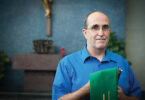
Leon Suprenant is the pastoral associate for administration in the office of the permanent diaconate. He also blogs at: www.archkck.org/blog.
by Leon Suprenant
I still vividly recall entering religious life in the mid-1980s.
A Los Angeles native and a fairly recent law school graduate, I knew I was stepping into a very different environment. As I settled into this life, I realized that I was doing many of the same things I had been doing for years.
I had already become accustomed to daily Mass and Holy Hour, as well as academic study. And, of course, the meals and recreation times were very enjoyably spent in community.
The one thing that was markedly different for me was praying the Liturgy of the Hours (or the Divine Office) at set times each day with the other seminarians and religious. I had used a breviary (a prayer book containing the Liturgy of the Hours) before entering the seminary, but the regularity and fervor of this prayer of the church was the most distinctive — and in many ways the most enriching — aspect of my seminary journey. This attraction to the Liturgy of the Hours has stayed with me ever since.
For that reason, the commitment of deacons and deacon candidates to pray the Liturgy of the Hours has fit me like an old, comfortable shoe as I’ve begun formation for the diaconate. I especially enjoy praying the Liturgy of the Hours with my awesome brother candidates during our formation weekends and other occasions.
Still, one of the best-kept secrets of Vatican II was the encouragement given to all Catholics to pray the Liturgy of the Hours:
“Pastors of souls should see to it that the chief hours, especially Vespers (commonly known today as Evening Prayer), are celebrated in common in church on Sundays and the more solemn feasts. And the laity, too, are encouraged to recite the divine Office, either with the priests, or among themselves, or even individually” (Constitution on the Sacred Liturgy, 100).
One of the defining characteristics of the first Christians was their commitment to communal prayer. The Acts of the Apostles tells us that the disciples gathered together at different hours for prayer (Acts 3:1; 10:9; 16:25). The church has continued this practice ever since.
How many of us have experienced our day “getting away from us”? The Liturgy of the Hours helps to punctuate the day with prayer and truly make our day’s activities a pleasing offering to God. Whenever we pray the Liturgy of the Hours, we make holy one of our most precious commodities: time. This prayer also connects us to the liturgical seasons and feast days, so that our personal prayer reflects the rhythm of the universal church.
You may purchase a breviary at any Catholic bookstore, and there are also apps and websites — such as: divineoffice.org and www.ibreviary.org — to help you get started.

